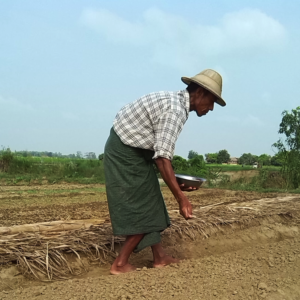 Nuestra vida abierta a Dios, como “la tierra buena” (según Mateo 13, 1-9) hace que su Palabra pueda dar fruto en nosotros, con una vida reconciliada, humanizada, y humanizadora en Cristo y en su Evangelio. Cristo nos llama a reconocer que a veces somos tierra reseca, o llena de piedras, o cargada de espinos… Y al reconocerlo, Él puede ir volviéndonos esa tierra buena, para que podamos acoger su Palabra y hacerla vida en el mundo de hoy, para dar mucho fruto.
Nuestra vida abierta a Dios, como “la tierra buena” (según Mateo 13, 1-9) hace que su Palabra pueda dar fruto en nosotros, con una vida reconciliada, humanizada, y humanizadora en Cristo y en su Evangelio. Cristo nos llama a reconocer que a veces somos tierra reseca, o llena de piedras, o cargada de espinos… Y al reconocerlo, Él puede ir volviéndonos esa tierra buena, para que podamos acoger su Palabra y hacerla vida en el mundo de hoy, para dar mucho fruto.
¿Tenemos corazones de piedra en los que nada crece? ¿O tenemos corazones abiertos a la Buena Noticia de la salvación, pero tan cubiertos por malas hierbas – como es la constante preocupación por los afanes de la vida y por cosas de poca importancia, que no nos deja tiempo para cultivar el crecimiento en nosotros de la Vida y del amor de Dios? Pidamos diariamente que sepamos dar buena y rica cosecha.
Oremos. “Padre, tú plantas en nuestros corazones la buena semilla de tu palabra y la riegas con tu gracia. Te pedimos que el buen terreno de nuestros corazones sea receptivo para cada palabra que tú nos diriges, en los acontecimientos de la vida, y en cada persona buena que encontramos. Ayúdanos a dar buena y rica cosecha de integridad, compasión, y amor, por el poder de Jesucristo, que vive y reina contigo por los siglos de los siglos. Amén.”
***
We often think of the Kingdom of God as a place, even a place in the future. Jesus, however, has a much more expansive notion of the Kingdom, including the present (and future) reality of all those who are committed to all that God is and stands for, as revealed to us through His life and teaching. They who are part of the Kingdom are those who work so that God’s will be done on earth, which is the establishment of the Kingdom. The many and various parables that Jesus delivers about this Kingdom are meant to help us understand how we are to enter into and become part of it, part of that Kingship of God to which we want to adhere with all our heart and soul.
One such parable is found in Matthew 13, 1-9. The parable itself is very straightforward. It speaks about a farmer sowing seed in his field, a typical Palestinian field of the time. It is obviously a very mixed patch of ground. There are paths going across it where people have long established a right of way. There are bits of rock sticking up above the ground with small hollows where water can gather after rain. Ploughing was done after the seed was sown so there are weeds and brambles growing wild all over the place. And then there are parts of the field which have good, fertile soil.
Parables in the Gospels usually make just one point. In this case, the message is that God’s plan will succeed, even though there seem to be setbacks. It was an important message for the early Christians to hear, as it is for us today. It is a word of hope and encouragement when we see how little success we seem to have at times in our work of spreading the Gospel. The message is: not to worry – God’s Word will prevail, it will always find fertile soil in which to grow and multiply and bring to us the Kingdom.

